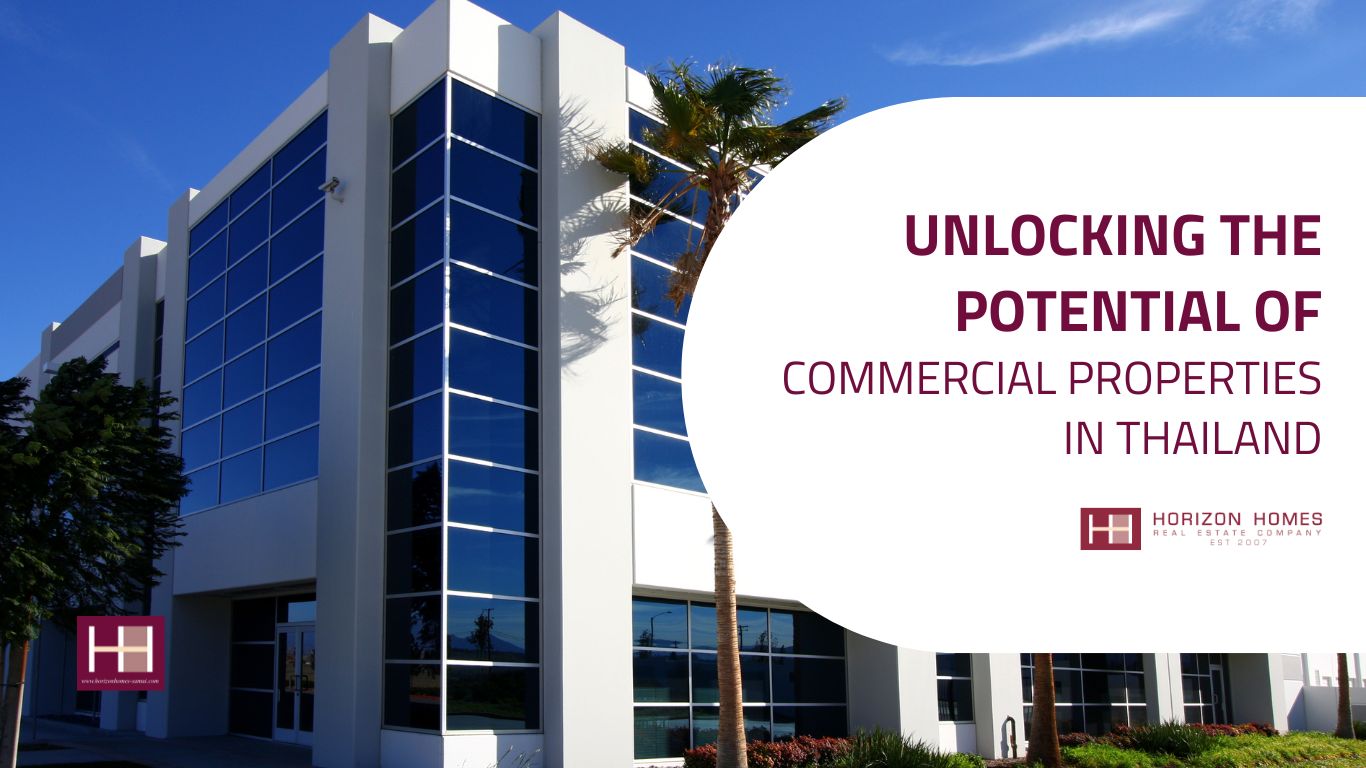Commercial properties are a pillar of economic activity, providing essential spaces for businesses to operate and grow. In Thailand, this sector is evolving rapidly, opening up profitable opportunities for investors, landlords, and companies alike.
This guide covers everything you need to know about commercial real estate in Thailand, from the types of properties available to the advantages and challenges of investing, as well as how to make the most of leasing and ownership options.
What is Commercial Real Estate?
Commercial real estate (CRE) refers to properties used exclusively for business activities, aimed at generating income through leasing or sales. Unlike residential properties, which are primarily for personal use, CRE properties host commercial tenants like retail shops, corporate offices, warehouses, and more.
The goal is to yield steady income through rental payments and property appreciation. In Thailand’s dynamic market, CRE includes office buildings, industrial sites, retail spaces, and multifamily housing complexes, offering diverse opportunities to suit different business and investment goals.
Types of Commercial Properties in Thailand
Thailand offers a variety of commercial property types, each suited to specific business needs:
- Office Spaces: Ideal for corporations, startups, and service providers. Key Thai cities like Bangkok offer Class A office spaces in business districts as well as budget-friendly options in suburban areas.
- Retail Spaces: From high-street stores to malls, retail spaces in Thailand cater to consumer-driven businesses in areas with high foot traffic, such as Sukhumvit and Silom.
- Industrial Properties: Warehouses, manufacturing hubs, and logistics facilities are available near ports and industrial zones.
- Multifamily Housing: Often referred to as commercial when rented, apartment complexes and condos provide reliable income streams in high-demand areas.
- Special Purpose: Hospitals, schools, and government buildings also fall under CRE, catering to specialized business needs.
Advantages of Investing in Commercial Properties
| Advantages of Investing in Commercial Properties | Description |
| Higher Income Potential | Commercial properties typically deliver higher returns than residential properties, with longer lease terms and higher rent per square meter. |
| Reliable Tenants | Business tenants, especially established companies, offer greater stability and are less likely to default on rent compared to residential tenants. |
| Portfolio Diversification | CRE provides an additional income stream, adding a buffer against market fluctuations and reducing overall investment risk. |
| Attractive Leasing Rates | Properties in high-demand areas with limited development see higher rental rates, making ownership especially profitable in such locations. |
Challenges of Commercial Real Estate in Thailand
While the potential rewards are significant, commercial real estate comes with its challenges:
- Higher Initial Costs: Acquiring and maintaining commercial properties requires substantial upfront capital.
- Vacancy Risks: Economic downturns can impact business occupancy rates, leading to potential vacancies and reduced income.
- Complex Regulations: CRE has more regulatory requirements compared to residential properties. Foreign investors must navigate zoning laws, ownership restrictions, and lease agreements specific to Thailand.
Key Locations for Commercial Properties in Thailand
Thailand’s major cities are hubs for different types of commercial real estate, each offering unique advantages:
- Bangkok: The business districts of Sukhumvit, Silom, and Sathorn provide a wide array of office and retail spaces.
- Phuket: Known for its booming tourism, this island is ideal for businesses in hospitality, retail, and service industries.
- Chiang Mai: Tech startups and creative industries thrive in this cultural hub, making it a favorable location for modern office spaces and coworking environments.
The Process of Leasing and Renting Commercial Properties
Renting commercial properties in Thailand involves several steps to ensure a successful arrangement. To get started, it’s important to first understand the commercial lease agreement—a legally binding document that outlines the terms and conditions for renting business property. For a deeper dive into the specifics of lease agreements, check out our detailed Commercial Lease Agreement Blog. Renting commercial properties in Thailand involves several steps to ensure a successful arrangement:
- Define Requirements: Consider your space needs, budget, and ideal location.
- Property Search: Partner with a commercial real estate agent who can help locate suitable properties within your criteria.
- Negotiation: Leases are typically negotiable, so be ready to discuss terms, including rent, lease duration, and responsibilities for repairs.
- Documentation: Review all legal documents with a real estate expert to avoid potential legal complications.
Role of Commercial Real Estate Agents
An experienced commercial real estate agent is invaluable when navigating the Thai market. Agents can offer insights into market trends, help negotiate favorable terms, and ensure compliance with local regulations. They assist with both renting and purchasing, making the process smoother for foreign investors unfamiliar with Thai laws.
How Investors Make Money in Commercial Real Estate
Investors profit from commercial real estate mainly through rental income and capital gains:
- Rental Income: Regular cash flow from tenants is a key revenue source for CRE investors, with longer leases typically providing more stability.
- Capital Appreciation: Property values in high-demand areas can increase significantly over time, providing a substantial return when sold.
To optimize returns, investors often focus on high-demand areas with low vacancy rates, where rental rates and property values are poised to grow. Additionally, regular maintenance and quality amenities increase property appeal and tenant satisfaction, further stabilizing income.
Getting Started in Commercial Real Estate
| Getting Started in Commercial Real Estate | Description |
| Research the Market | Familiarize yourself with different property types, their advantages, and potential risks to understand the commercial real estate landscape. |
| Partner with a Real Estate Agent | A knowledgeable agent can guide you through the market, helping you make informed and strategic decisions. |
| Secure Financing | Thai banks offer various financing options for commercial properties. Understanding these can make entering the market easier and more accessible. |
| Start Small | For beginners in CRE, consider leasing or investing in smaller properties initially, then gradually move on to larger projects as you gain experience. |
Conclusion
Commercial real estate in Thailand presents a world of possibilities for investors and business owners. With diverse property types, strong rental potential, and attractive capital gains in key cities, this sector has proven itself resilient and lucrative. While challenges such as high initial costs and regulatory requirements exist, they can be managed with the right knowledge, strategic planning, and professional guidance.
For those considering their next step, whether investing or leasing, Thailand’s CRE market offers robust opportunities to achieve steady returns and long-term financial growth.
Considering a move into Thailand’s commercial real estate market? Horizon Homes can help you find the ideal property, manage negotiations, and provide the guidance you need for a smooth investment journey. Discover your next opportunity with Horizon Homes today.




